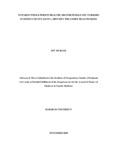| dc.description.abstract | Background: Female Sex Workers (FSWs) have complex health needs that predispose them to a higher morbidity and mortality risk than the general population. They have unbounded challenges for example stigma and social exclusion that hinder them from accessing and utilizing healthcare. The healthcare system in Kenya has responded to their physical health needs by providing treatment and preventive sexual and reproductive health services however there is minimal knowledge on how their psychological, social and spiritual needs are met. To meet FSWs needs, it is important to have a paradigm shift from the disease model to a whole person care (WPC) model where there is an integration of the bio-physical, psychosocial and spiritual aspects of health. This study gives us an understanding of female sex workers‘ experiences and challenges when seeking and utilizing healthcare. It also describes the healthcare practices towards female sex workers by healthcare workers, informs on their unmet health needs and their perspective on whole-person care. Methodology: This is a qualitative research design that targeted the population of female sex workers living in Bomet County, Kenya. It also included healthcare workers who provide health services to this population. The sampling procedure was non- probability, purposive through respondent-driven snowball sampling. Sampling was done until saturation was achieved where data collected did not have any new information. Data was collected through in-depth individual interviews, healthcare workers‘ interviews and one focus group discussion. Informed consent was obtained for each interviewee and confidentiality of all participants was assured. Safe data handling and specific ethical considerations relating to female sex workers was observed for this study. Results: FSWs experience financial constraints, community and health worker stigma, insufficient drugs in the health facilities which includes their children‘s prophylaxis; antiretroviral (ART) drugs and poor awareness of health services available to them. Access to healthcare services was a common challenge experienced by the FSWs. The healthcare providers provide sexual and reproductive health services as well as creation of health awareness through community sensitization against stigma of FSWs with an aim of improving utilization of healthcare services. They also provide psychological and social support to the women and their children. The FSWs perspective of whole person care was that it would improve their lives in a way that they can better handle stressful conditions and even find ways on coming out of sex work in contrast to the health workers‘ perspective, where they were skeptical to integrate the spiritual aspect in WPC during provision of healthcare services. Conclusion: Female sex workers have complex unmet health needs that go beyond the physical. Healthcare providers can meet these health needs by focusing on the person rather than the disease through whole person care service delivery. The unmet health needs namely, lack of access to essential treatment and promotive health services for FSWs, the need for more psychological, spiritual care and an integration of all the four aspects of whole person care emerged in this study. The need to promptly address these unmet health needs by the healthcare system of Kenya has been illustrated if Universal Health Coverage is to be made a reality. | en_US |

